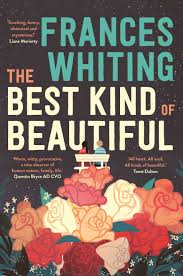The Best Kind of Beautiful (Pan Macmillan 2019), the second novel by Frances Whiting, is the best kind of book, especially for these weird times we’re living through, with readers often searching out novels that are light-hearted, funny, warm, poignant and uplifting.
This is a book about ordinary people living ordinary lives and yet from amidst the banal, Whiting sifts the magical and the poetic, the wise and the wonderful, and transports both the characters and the reader onto a different level.
This book is about two loners who find each other; two people with difficult pasts who find a way to connect. Albert Flowers loves all things botanical. He works for The Green Team, with offices based in the local library, and is on a mission to replant native bushland in the Mount Bell State Forest. He seems quiet and isolated at work, but appears to have an active social life, with parties almost every weekend. Florence Saint Claire also works at The Green Team, and also has a green thumb. Unlike Albert, she really is a loner, revelling in the monotony of her work as she escapes the public scrutiny of her past life with her famous performing family. These two souls connect and befriend each other, but little do they realise that each is not quite what the other seems. Secrets and lies abound, and as the novel progresses, both of their tragic family histories are revealed. The yearning ambitions each have nurtured but concealed, related to work and family, friendships and achievement, are nudged into the open as they begin to trust each other.
Whiting deconstructs the dynamics of family as she explores each of the main character’s backgrounds. With a huge cast, the novel gradually reveals Albert’s troubled past and Florence’s equally difficult history, with all of their family members coming to life through a complex recounting of past events. There is a large cast of minor characters, too, who are integral to the plot: friends, neighbours, colleagues … all play a part in the circumstances that bring Florence and Albert spinning towards each other.
The themes of the novel include companionship, love, friendship, parental love and family. The author does a particularly good job of navigating the suffocating grip of grief, and of depicting how the ripples of loss can reverberate long after someone is gone. And all of this revolves around the twin subjects of music and gardens, which are celebrated as rejuvenations for the human spirit.
This is a perfect holiday read; an ideal gift for your mother or your sister or your best friend. Whiting is a superb writer of the human experience, and this is demonstrated in her witty dialogue and her sharp observations of the foibles and fallibilities we all experience. You are guaranteed to recognise some aspect of your parents, your children, your neighbours or perhaps even yourself.

